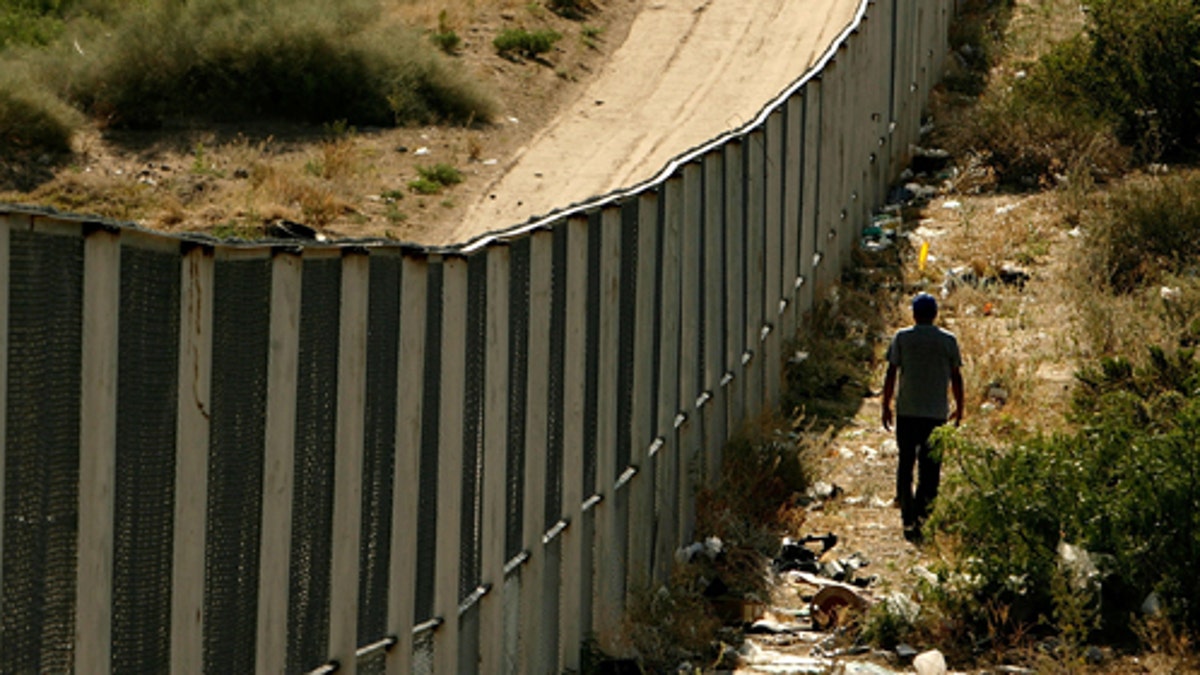
CIUDAD JUAREZ, CHIHUAHUA - JUNE 29: A man walks along the border fence between the U.S. and Mexico on June 29, 2007 in the Anapra area of Ciudad Juarez, Mexico. This area is a popular crossing spot for immigrants to ilegally cross into the United States because houses are close to the border on the south side and the highway is close to the north side. (Photo by Chip Somodevilla/Getty Images) (2007 Getty Images)
While Homeland Security officials stick to their claim that the border is as "secure as it’s ever been," this week the Border Patrol effectively cut some 4,000 agents from its force due to budget cuts — 20 percent of its total manpower.
The cuts, meant to close a $250 million shortfall due to “sequestration,” forced Border Patrol brass to make some tough choices. One option included putting agents on furlough two days a month — but agency administrators instead opted to eliminate overtime, according to Shawn Moran, vice president of the National Border Patrol Council.
"The border is not secure. It's safer than it has been in decades but it is by no means secure and it won't be if you cut 20 percent of your workforce," Moran said Wednesday.
"This is no longer about border security,” Moran added. “This has become a corporate mentality. They say it's about the mission but if it was we'd be out there securing the border. They’re worried about securing bottom line."
A Homeland Security Department spokesman took exception to Moran's remarks, calling them out of line and untrue. The department maintained the cuts were necessary to comply with automatic spending cuts — “the sequester.”
While the overtime cuts could be seen as inconsequential, agents insisted it’s actually quite a blow. In many border areas, agents don't actually live in the immediate border region. They drive from home to headquarters, which in Tucson is more than an hour from the border, about the same as in San Diego. For agents in Casa Grande, Arizona, the commute is closer to 2 hours.
For the agency, the drive time is treated as overtime, thus allowing line agents to put in a full eight-hour shift actually patrolling the border. However, effective April 7, agents will be forced to leave the border after a five- or six-hour shift in order to make it back under the mandated eight hours.
Agents said the down side will be that areas of the border will be left unprotected for hours at a time.
"This is best thing that could happen to smugglers and coyotes and drug smuggling organizations,” said Moran. “They already know the border patrol is looking at staffing cuts.”
In some sectors, managers will increase the number of shifts to cover the overtime cuts, but they recognized that will mean fewer agents on patrol. In Arizona, elimination of overtime equates to 700 fewer agents on a daily basis — nationwide it’s 3,000 to 4,000.
Homeland Security issued a statement when asked for comment on the impact of the sequester cuts:
"The automatic budget reductions must be applied to virtually every program, project, and activity that DHS has and will negatively affect the mission readiness and capabilities of the men and women on our front lines.”
At border stations across the country, this is issue is front and center. Not just because it affects the mission — keeping the border secure — but also agents’ take home pay.
To agents, it means a 25 percent pay cut, since overtime is part of their pay package. The Border Patrol has actually advertised overtime as part of take home pay.
Agents with young families said the cut for them will be devastating. Supervisors and chaplains report an increase in the number of agents seeking help and advice on how to handle the financial pressure.
"Lately I feel like a financial planner, marriage counselor and shrink," said one agency administrator in California manager, who requested anonymity. "Morale is horrible. They feel Washington doesn't believe in the mission."
Texas Republican Sen. John Cornyn blasted the decision to cut border agents’ overtime pay, saying it’s the latest example of President Obama putting national security at risk.
“The Obama Administration’s actions amount to nothing short of a calculated, willful neglect of what should be a President’s top priority: Protecting the homeland and keeping Americans safe.”
Follow us on twitter.com/foxnewslatino
Like us at facebook.com/foxnewslatino
